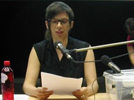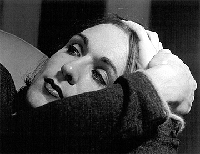|
press プレス |

|
The Laurence Rassel Show - Chris |
In Speaking of Art, August 18 2007.
 |
| The Laurence Rassel Show, cover image |
The Hurdle
The first major hurdle one encounters when preparing to write about The Laurence Rassel Show is as follows: How does the author of any reasonable critique appropriately review the work in question while properly maneuvering around the fact that one of the main themes within the work being critiqued is the fetishization of the entire concept of authorship to begin with?
Let me take a step back…
The Laurence Rassel Show is the newest audio release from Public Record, an internet-based record label founded by the activist art organization, Ultra-red. Specifically, The Laurence Rassel Show is a collaboration between cyberfeminist Laurence Rassel and musician/trans-activist Terre Thaemlitz, both, arguably, well-known and un-known masters of their respective fields.
Let me take another step back…
The Context
Almost as a follow up on our recent discussion, as initiated by Spk.Art.’s own Tempest, regarding the freedom of information available through the use of the internet(s), Public Record is
… the internet-based archive of the Ultra-red organization established for the distribution of work by Ultra-red members and allies. … Born in 2004,…Public Record expands on the group’s mission statement: first, to facilitate cooperation between artists and social movements; second, to occupy the borders between art and organizing; and, third, to radicalize the conventions of electronic music and sound art.Seems to be right up our alley, eh?
On the main page of the Public Record website, there is a brief tip o’ the hat to the relevance of artistic expression which attempts to live within the world of social or political subjects. This message, in its succinctness, is the crux of the Ultra-red organization.
[A]rtists who assume the mantle of revolutionaries would do better engaging actual political struggles than promoting their individual artistic careers.Public Record and the Ultra-red organization attempt to address social issues not by simply creating obtuse works with vague political titles, they dive in head first and Get Involved with social change. This is seen in the various releases by Ultra-red in the years prior to the inception of Public Record as well as what has been produced since its creation in 2004. (For example, Structural Adjustments (2000) is based on protests that occurred in reaction to the Los Angeles Housing Authority’s attempt to displace 1200 homes in the name of neighborhood reconstruction and BLOK70 (2006) addresses the recent expansion of the European Union into Eastern Europe and the effect this has had on the migrant policies of those countries.)
The Release
Stepping forward to the topic of The Laurence Rassel Show again, we have the latest release by new collaborators to the Ultra-red organization, Laurence Rassel and Terre Thaemlitz performing the radio-drama, The Laurence Rassel Show. The press release for The Laurence Rassel Show goes a little like this:
Public Record is thrilled to announce the release of Terre Thaemlitz’ sixteenth full-length album, and his first for the free-download online label. THE LAURENCE RASSEL SHOW began as a specially commissioned collaboration with cyberfeminist Laurence Rassel of Belgium’s Constant organization. Commissioned by German public radio in 2005, the Thaemlitz and Rassel collaboration set its sights on the politics of copyright ownership. Critical of both corporate property laws and the copyleft movement, the project ran into an unexpected roadblock when it was pulled from broadcast for being too controversial.Or rather, in Thaemlitz's words:A joint-release with Thaemlitz’ own Comatonse label … and Constant, THE LAURENCE RASSEL SHOW is cabaret for theory-queen revolutionaries. Subtitled "the post-feminist radio drama assassinated before broadcast," THE LAURENCE RASSEL SHOW weaves together gender-queer analysis, mis-taken identities, liberated citations … [.]
[Laurence and I] wanted to counter this notion of fetishizing the recognized or "authored" body with a story about the corresponding way in which the patriarchal notions of authorship also extend to the fetishization of the invisible, or the non-author.
 |
| Laurence Rassel |
The project began with Thaemlitz and Rassel spending a week in and around Thaemlitz’s home in Japan recording themselves discussing the project and the guests reading from text. Afterwards, Thaemlitz took control of the audio and interspersed the dialogue with stolen audio clips and layered it all with his signature audio processing techniques, thus giving the piece its final "electro-acoustic" quality.
The main difference between The Laurence Rassel Show and anything found in Thaemlitz’s previous work is that because it was intended orginally as a radio show, he went to greater lengths than usual to ensure that most of the dialogue remained relatively understandable. The final result being that this is less of a musical release and more of an audio essay covering themes of social norms and history as they relate to the ideas of authorship and feminism.
| excerpt :: A Special Message from Joan Smith |
The Leap
So we have enough of the background to take that final step forward and jump the ship specifically addressed by The Laurence Rassel Show. I’m going to go ahead and openly act as author here in order to discuss the piece. Obviously that flies in the face of an issue The Laurence Rassel Show specifically addresses, but shit, thats what I’m going to do.
Long story short: The Laurence Rassel Show is brilliant.
Fair warning for those of you inclined to discourage against or shake your head at heavy-handed theoretical discussions: The Laurence Rassel Show is extremely heavy handed. Its thick in theory and certainly way over the top when it comes to in-depth discussion of the causes and effects of underlying social issues in the realm of feminism and patriarchy, authorship and copyright. But lets be honest here; thats what we all came for. In addition to Thaemlitz’s numerous socially charged audio releases, he also has written a number of articles which address the same or similar issues in much greater detail (mostly because he uses ‘words’ in the articles instead of that pesky confusion-inducing medium, ’sound’). Certainly then, the topics discussed in The Laurence Rassel Show should come as no surprise, but the degree to which they are dealt with is impressive.
| excerpt :: Fetishism as a Means of Authoring the Invisible |
The Subjects
Most of The Laurence Rassel Show is structured around monologues or the back-and-forth banter between Thaemlitz and Rassel, in which they both casually run away with the conversation depending on the subject. I think what intrigues me about these heavily theoretical discussions is the fact that whether or not I agree with their conclusions, or even if I think they may be taking the analysis too far, or are becoming too abstract, I find I am always left affected by the discussion. There is always something to take away from a discussion of this magnitude.
Also of note is the fact that along with the audio available for download at Public Record, a complete transcript of the show can be downloaded. This is essential. I can imagine no way that this work could simply be listened to in order to fully grasp everything contained in it, if for no other reason than I do not speak fluent French and therefore the monologues spoken in French happen to slide right by me…
 |
| Terre Thaemlitz, c.2000 |
Anyone who writes about a work which involves Terre Thaemlitz must, of course, discuss the actual audio within the work. That’s what the man is famous for, right? Similar to Ultra-red, Thaemlitz’s work lives in that slippery realm of ‘electro-acoustic’ social commentary which straddles the line between abstract, arrhythmic sound collage and ‘minimalist electronic music’. If you are expecting this from The Laurence Rassel Show you will, like me, (at least initially) be disappointed. Although there is a great deal of audio processing occurring under the surface of this work, almost none of it is structured into the form of songs which occasionally pop up on his albums. This was a major turn-off when, about 20 minutes in, I came to the realization that this work was something altogether new for Thaemlitz. Luckily, by then The Laurence Rassel Show had grabbed me and I just didn’t care about the past anymore.
The Laurence Rassel Show is a radio-drama first and foremost; leave your favorite ‘minimalist electronic music’ hat at the door. Rest assured though, there are plenty of moments in The Laurence Rassel Show in which Thaemlitz employs wonderful acts of sabotage on the somewhat straightforward dialogue by confusing the audio and layering too much at one time or mixing beyond comprehension. As expected, those moments work beautifully in the context of the show’s theory and in its practice. Thaemlitz uses these processes to audibly reduce the spoken words to abstract sounds, thus robbing the words themselves of any distinguishable origin, or author.
In this specific process can be found the genius of The Laurence Rassel Show. It is a grand work that, by using multiple layers of form and function, both discusses revolutionary social issues while at the same time it becomes an example of those very acts being discussed.
| excerpt :: A Special Message from Roland Barthes |
The Conclusion
The Laurence Rassel Show is a phenomenal new work by Laurence Rassel and Terre Thaemlitz. Anyone interested in the previous work of Thaemlitz, Ultra-red, or the subjects of patriarchy, feminism, gender, authorship or copyright would be well served to give it a listen. And hell, its free to download; what do you have to lose?
As the original Public Record press release states: "Listen for a change."